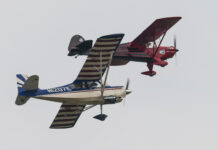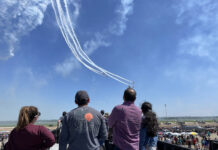Air show flying is a dynamic art form. It is physically, mentally and emotionally demanding. Extreme maneuvering in the low-level environment demands skill and focus, plus years of practice and an attitude of caring about yourself, your airplane, and the people around you. The behavior of each individual performer can affect the fate of the entire air show community, so air show pilots monitor, evaluate, coach, encourage and mentor each other.
We asked eight respected veterans in the business to give us their perspective on issues related to attitude and experience.
Kent Pietsch
I don’t care if you have a dime or a million dollars, it should be your responsibility to help nurture this business. The business has to be important to you because any one pilot can screw this business up. And attitude is everything. That is something that has to be discussed with new pilots.
If they come in with a preconceived notion [that] they’re a great pilot and they don’t have the reasoning to want to learn more, then they are in trouble. I personally have a lot to learn every time I fly.
This is an entitled society and so many people think they are infallible when they are not. It is somebody else’s fault if they get hurt. That is what some people think. But, when you are flying your airplane, you are the one who is responsible. That is the deal. Nobody else can do it.
At the end of an ACE evaluation, I think you should tell them, “I did everything I can for you. It’s all up to you now. I am here to evaluate you and I don’t mind mentoring you, too. And I don’t mind helping you to get going on the right path. But you are flying that airplane. And it is up to you not to be an ass and kill yourself. But I can’t tell you not to. If you want to do that, you are going to do that. But we are trying to give you every opportunity not to, and to help out every way that we can.”
Bob Bishop
I was an ACE for twenty some odd years. And one of the things I always looked at, number one, was how did they learn aerobatics? What is their training level? Are they coming to me after they’ve only had two hours of training and ten hours of practice? I’ve actually run into that. So, when you come to take an evaluation, you had better know how to do aerobatics as if it is second nature.
There are a lot of things to know about putting your routine together and executing it. But if you don’t know how to do loops and rolls to the point that you don’t have to think about it, you’re probably not qualified. I actually would tell people, “I cannot continue this evaluation. You are not qualified. You have not spent enough time at this. You do not have enough experience to be applying for this.”
To me, you need at least a minimum of a ten-hour aerobatic course and/or some kind of a mentoring situation, where there is some kind of mentor who is there, actually working with you, who is able to start you up high and work you through all this stuff. Because I’ve watched fatal routines with new people, and I can guarantee you they did not have enough aerobatic experience to start with.
Once, I was watching a T-6 routine and went, “Oh God. No, stop! Please somebody, stop this guy.” I could see what was happening. The guy did not know enough about aerobatics. He was flying a T-6. He was in fear, I guarantee you. I taught aerobatics for a couple thousand hours and what I know is that the number one mistake made by a novice is that, under fear, they will revert to old patterns, and they will begin pulling back on the stick to hurry a roll.
Pulling back on the stick hurries a turn. It does not hurry a roll…or, at least, not enough. The tendency for people in a roll: if they get frightened, they forget to keep the ailerons all the way over. I’ve seen this over and over from hundreds of hours of watching people. When they first start trying to do aerobatics, the single, biggest, fatal error and the single, biggest error in training is that they don’t remember to keep the stick over. And they forget that that back pressure will not hurry the roll. It won’t get you out of trouble. It will get you into it.
This guy I watched, buried himself off of a barrel roll. But he had almost hit the ground in a reverse Cuban and — instead of stopping — he went right into a barrel roll and I could see what happened. He was pulling so hard on that airplane that he wasn’t rolling it. He went in almost 90 degrees. It was that bad.
So that is my first thing: have enough experience. Make sure you have the training. Don’t come to an evaluation unprepared. Just because you don’t kill yourself doesn’t mean I am going to pass you.
I find that rational fears are good. It is good not to jump off a tall building without a parachute. That is a good rational fear. But, when we do things in fear, we wind up getting exactly what we feared…fear as a boomerang. So I think one has to be able to fly in a condition of heightened alert, but if you are really frightened, you shouldn’t be doing it. I know that my concentration level would go up so high before doing my routine that I would actually kind of go into a concentration trance. People would talk to me on the ground before [my performance] and I would not remember a damn thing they said.
I think people should come to an evaluation qualified to fly air shows. I think competition is a great way to do it and, if not, then just a lot of practice time with someone tutoring or mentoring you. I think trying to find a mentor in this business is a good thing. Charlie Hillard was a mentor to me. We worked for a year together. What a deal! I am quite convinced that helped me set my attitude and was the thing that kept me out of trouble.
Warren Pietsch
Aerobatics is a free style type of flying that takes dedication and passion that makes you the type of pilot that you are going to be. You are either going to be cocky and a show off, which — in my opinion — makes you dangerous. Or you are going to be a guy that is really interested in being a good pilot and wants to learn that stuff and get better and better.
New air show acts come and go. There are some guys that you can’t teach, and guys that don’t want to learn from anybody else. They don’t want to listen. I don’t know how you are going to fix those guys. But if you watch the air show acts, you see some guys in an air show and you say, “Well, he ain’t going to be around long.” And those are the guys that you can’t teach, the guys that do things like so many of them that have been hurt, or guys that didn’t want to learn from anybody else. They didn’t want to listen. I don’t know how you are going to fix that.
Air show flying is a risky business. When you aim an airplane straight down at the ground 300 feet up, it’s not as safe as going straight and level. It just isn’t. There is no way to make it that way. But there are ways to make it better.
Bud Granley said what he wanted to promote was the buddy system, where guys take on the responsibility to go give the guy an opportunity to listen. Or go to him at the beginning of the show to say, “Hey, would you watch my act and critique me? I respect you. Please watch my act and tell me what I did.” And mean it when you say that. Then, when you are asked to do that, take the responsibility to stand and watch the guy’s show and critique him. Come back to him afterwards.
One year at Reno, I got pretty close to the ground and Jim Peitz, who is a great buddy of mine, came over and said, “How far was your wingtip off the ground?” I said, “Eight inches.” He said, “Exactly! Don’t do that anymore.” And he said, “I’m glad to know that you knew where it was. There is no reason to do that.” And you know what? He was right. You are feeling your oats and everything is going great. And sometimes you get a little carried away.
There is no question that everybody has an ego and air show pilots have super egos. That is why we are here. We want to be in front of a crowd. We want to show what we can do. And you can say all you want about everything else, but the fact is we want to be in front of a crowd. And so that sets the personality a little bit, right there.
Debbie Gary
It takes strong self-confidence and a sense of self worth to perform safely with style and flair. But it also takes some kind of self-policing to keep our air show egos from puffing up to the point where they blind us and impair our connection to reality.
Deep under everything, we need humility, because this business throws us out there where people praise us, interview us, write about us, and pay way too much attention to us, sometimes. Over time, there is a natural arc, where almost every performer gets an exaggerated opinion of himself or herself. It’s a job hazard. But, if you are lucky, some totally humiliating, humbling experience brings you back down to earth and reality.
It helps to have some kind of regulating, self-alert system. Mine used to be landing the Pitts at the end of a show. Since it took total concentration to grease that plane on, I could tell by little hops, skips and jumps when I was flying high on my ego instead of staying centered and focused on my landing.
Patty Wagstaff
You have to be humble and you have to listen to other people. The biggest thing is the Dunning Krueger effect, which states that the more you know the less competent you think you are, because you know there is so much you don’t know. The less you know, the more you think you know because you don’t know what you don’t know. In air shows, there is so much you don’t know without experience. There is no shortcut. That is the bottom line. There is no short cut.
It takes years and years. A lot of people think there are shortcuts. I heard someone complaining because they weren’t booking any shows after they had put several years into training and had bought a top level airplane, but there is so much to it. I remember Mike Goulian and I saying, “It took us years to get where we are. We didn’t just come out of the box and all of a sudden we were booking shows.” Where did they get this idea? There is a reason people aren’t yet hiring them. The smart air show event organizer wants experienced performers.
Every time I have screwed up, come really close to another airplane, or have done something dumb, it was always overconfidence.
What Bob Hoover really made me realize is that, to be great in this business, you have to be very smart. You have to be smart to be a great athlete in anything you do. And, to survive a very dangerous, risky business, you have to be lucky, too. Bob survived a lot of accidents because he was smart. He thought about things. He was able to integrate what he learned.
My dad told me, “Listen to everybody. You may think they are a jerk, you may not like them, but –when it comes to flying — you’ve got to listen to everybody.” You don’t want to reinvent the wheel.
You can’t just read one book and digest everything. You have to read every book that is out there. I had to read everything, because there might be some little clue in every one. To me, that is the intelligent way to do it. I always felt like there might be one little crumb of information that you didn’t understand that would pop back up later. You might not get it when you first read it, but — when the time comes and you are in an emergency and your mind is working differently — it might pop up.
Another essential skill is compartmentalizing, putting things out of your mind and just focusing on your flight. One time, when a friend was going through a personal issue, divorce and stuff, I asked him, “Are you sure you are okay to be doing this show?” He seemed really distraught. But he said, “Yeah, I have so much experience compartmentalizing in the military, from being in Vietnam and so on, that I feel I am really good at it, and I feel very safe.” I thought that was interesting.
We can learn so much from military flying because they have such a great safety record, something they didn’t always have. They had lots of crashes in the early days, the wars and all that. But since then, they have a stellar safety record for what they do. I mean, the training, fighting, all the kinds of missions they do. They have a fantastic safety record. And a big part of that is compartmentalization.
Bud Granley
Before you take off or land, you have to stop and look around and tell yourself, “Don’t do anything stupid.” If you are full of yourself, you have to be really careful, because something bad is going to happen.
But what do you do when you see somebody else doing something stupid? You try to be kind about it, and you go up to them [politely and carefully]. And if that doesn’t work, you have to raise a red flag. There is a process, good manners, where you start with the Buddy System, “Are you sure that is safe?”
I asked one fellow, “My God, you recovered from that spin so low. It must recover awesomely because it recovered at 200, 300 feet. And that is not a problem if the airplane just comes right out.” He said, “Oh, no, it takes two or three turns to come out.”
I said, “Then you better quit doing that or move the recovery up.” He said, “Oh, no, it’s fine. It always comes out.”
“You better not do that. You better move it up.” So I got everybody watching him. We all said, “Move it up.” But he wouldn’t. You couldn’t get his attention. He was going to do it anyway. And guess what happened to him? He spun in.
Bill Stein
Early on, flying aerobatics, in particular, I decided not to try and hide my mistakes, because a lot of the guys I knew would make big mistakes and try to hide them. I’d just watch them suffer through trying to keep people from figuring it out. I just decided, Okay, I’m just going to tell people about it. Nick [Nilmeyer] and I were out there every day watching each other and learning together and we learned from our mistakes as much as from our successes. And so sharing mistakes was obviously a good thing for everybody. I decided that I am not going to be embarrassed by my mistakes. I’m just going to own them and wear them. Sharing all of those hard lessons learned has turned out to be one of the best training tools that I have when mentoring a newcomer into the industry.
When people come to me for an evaluation, I ask them if they are motivated by the adoration of the crowds or by internal things. “I don’t know. What do you mean? How do I tell?” I go, “Do you have just as much fun when you practice as you do when you fly an air show?” If they say yes, then they are probably for real and if they say no, then I think, “Great, this is somebody that I am going to worry about.” If people are motivated externally, they are going to show off, they might have bad situational awareness, they are going to have occasional judgment issues, and you’ve got to talk to them about the dangers of being show-offs.
It seems like all of the great performers have developed the same set of priorities when they are at an air show: 1 – Stay alive; 2 – Keep your license; 3 – Get rehired; 4- Have fun; 5 – Impress the other pilots. It is really easy to get those out of order sometimes, especially when you are trying hard to please the people who hired you for the weekend.
There should be some sort of credentials. Pilots should show up with an history of how they learned aerobatics, what their training program has been like, and what they think they know. And some reasonably good self-analysis of what level of skill they currently possess. It is very important to have an accurate gauge of your own skill level so you can do a good job of risk-analysis, especially when the margin for error is so low.
I tell people, “If you get an ACE evaluation completed successfully, that means that you can go fly a show tomorrow.” If you are just some guy and you have a shit hot Extra, or something, and you want an ACE evaluation and you want to be an air show pilot and you’ve never competed or you are just starting to fly [in the] Sportsman [category of aerobatic competition], I might not be your guy because it would be hard to believe in you yet. A lot of these procedures need to be learned somewhere and that is one of the things that contests are great for. So I talk to a guy like that about if they are really ready to fly shows right now, and maybe let’s do a training program for them. It isn’t that they won’t ever be ready, it is just that they haven’t yet built up all of the experience and skills that are needed to safely perform at air shows.
Lee Lauderback
Nobody can argue the point that this is a life or death business. It is not netting butterflies. This is about extreme performance and the end result is, that if it isn’t right, you can lose your life, kill other people or both.
When a pilot comes for an initial ACE evaluation, one of the questions I will ask is, “Where did you do your training?” I feel that people like Michael Goulian and his aerobatic school, Tucker, his school, Greg Koontz, provide excellent entry level instruction. Those are the ways people should start instead of going out there and saying, “Somebody showed me how to do a loop and now I’m an air show guy. I can do a loop low to the ground.” I think that is totally wrong. Or, they say, “Well, I trained myself.” Okay, we are already sort of on thin ice on that one.
Motivation is important, but I think the training is absolutely essential and I think that is what we need to get into the people coming into this business. There are many ways to do it, but it takes time. It is not just going to an aerobatic school for a week and then you are ready to be an air show pilot. You can’t learn to be an air show pilot in a week.
If you come to me and say, “I want to be an air show pilot in the P-51,” I’d say, “Okay, come and go through the check out program. Then I want you to go get 250 hours in that airplane, then come back and talk to me about it.”
I don’t sit in the back of an airplane and teach low level aerobatics. There just isn’t room for a training-and-correction kind of thing. I’ll go up and set a hard deck at 3,000 feet and I’ll work with you all day long on a level roll, or whatever. But low to the ground: it is very final.








